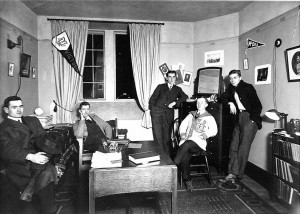
In response to Joe Adamson’s post:
Frye’s earliest defense of the Honour Course is in a piece he wrote for Acta Victoriana at the end of his fourth year at Victoria College: “The Pass Course: A Polemic.” There he argues that one of the virtues of the Honour Course is that “the subjects are all grouped around a restricted and clearly defined area of knowledge” (CW 7, 38). In his “Response to the Macpherson Report,” which is posted in the blog’s Library, Frye wrote “The Honour course represents a unique contribution to undergraduate teaching on the continent, and at its best it affords as good an undergraduate training as can be got anywhere.” This was a judgment he continued to defend, repeating it, for example, in a 1973 letter to Martha England (Selected Letters, 151) and elsewhere. Otherwise:
The General Course in arts assumes that an integrated curriculum, even in so specialized a world as ours, is, up to a point, possible at the university level. The Honour Course, on the other hand, is based on the assumption than any genuine discipline can be used as a centre of knowledge, the radius of expansion from the centre being the student’s responsibility. Either assumption is justifiable, but that of the Honour Course is perhaps closer to this age of intellectual pluralism. (“The Critical Discipline,” CW 7, 113)
I have been accused, if that is the word, of defending the Honour Course whenever I get a chance, and this is one more chance. I remain obstinately of the opinion that the Honour Course, with all its rigidity and built-in administrative absurdities, gave the best undergraduate training available on the North American continent, and the best teacher training for the instructor as well. (“The Beginning of the Word,” CW 7, 540)
Other of Frye’s judgments about the Honour Course can be found by following the entries in the index to Northrop Frye’s Writings on Education (CW 7).
Here’s the way Mary Culley described the Honours course in English during the early 1950s:
The Honours Course in English Language and Literature was arranged sequentially. In the first year we started out with Anglo‑Saxon up to the Middle Ages (Chaucer, Malory, the miracle plays); second year, the Elizabethan Age (Shakespeare, the Reformation, Milton); third year, the Age of Reason, the classicists, early Romanticism; fourth year, later Romantics, the Victorian Age, and early twentieth century. In each time period we took three or four English courses––novels, drama, poetry, essays, plus parallel courses of the same period from Honours History, Honours Philosophy, and Honours French (or another language). Marvellous. (Letter of 7 June 1994)
One of the attractions of the Honour Course for Frye was this notion of parallel courses, so that while students were studying medieval literature during their first year, they would be studying medieval history and medieval philosophy at the same time.
